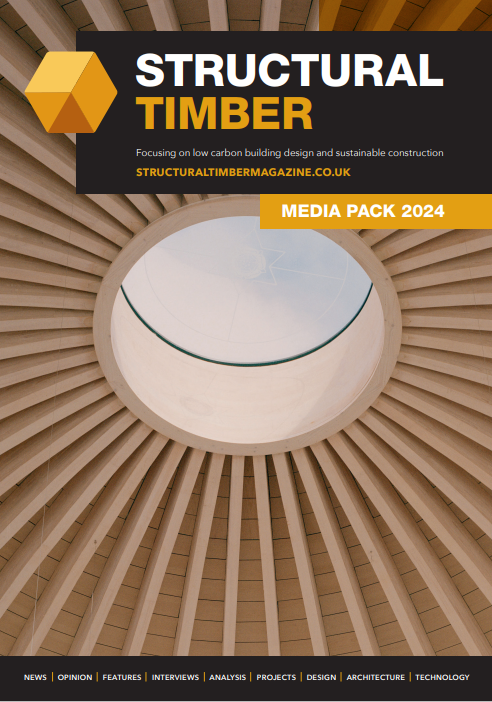Timber is the Way to Go
Successfully delivering the Government's Timber In Construction Policy Roadmap will have profound changes for the UK. Andrew Carpenter, Chief Executive of the STA, discusses potential industry impact.
It's an interesting time to be part of the timber industry, as renewed Government attention has firmly placed this low carbon material at the top of the construction agenda. Published in December 2023, following many months of close collaboration within the industry, the Timber in Construction (TiC) Policy Roadmap is an unprecedented move from the Government, as it demonstrates a clear and actionable desire to explore low carbon building materials to achieve net zero targets.
It's important to emphasise the scale of this project, which was headed by DEFRA, and involved organisations from across the sector, including the STA who led the structural timber sector involvement alongside Timber Development UK (TDUK) and Confederation of Forest Industries (Confor).
The overall objective is to safely increase the amount of timber used in construction with this higher goal divided into first six and later seven key topics. Both opportunities and barriers were interrogated, recommendations outlined, with subsequent actions then split between "what government will do" and "what industry will do". The priority themes are demand, supply, carbon, building safety, insurance, skills and innovation. Each topic had a separate working group made up of industry experts.
Between the STA, TDUK and Confor, we utilised the expertise and experience available to curate a report on the industry back in December 2022, and much of this report was used within the roadmap and essentially drove the data side of the document. It was crucial that we had accurate data in terms of market share and carbon impact, and we wanted to demonstrate just how much of a positive impact the increased use of timber in construction would have.
As has already been mentioned, a big part of the process was identifying the main barriers that prevent the wider adoption of structural timber. A key driver from DEFRA was the use of more homegrown timber, but the barrier for this is considerably more long term. While this isn't something that can be achieved immediately, the STA are working closely with Confor to support this achievement in the long term.
In the shorter term, the key is to help new adopters of structural timber systems make the transition from more traditional methods. Sadly, there is still a myth that timber is not as cost effective as other materials, which presents another considerable barrier. However, we are now developing a new cost comparison tool that covers a range of sectors to offer transparency.
One major development that will help move delivery of the roadmap forwards, is the appointment of the STA, TDUK and Confor as joint Secretariat of the TiC working group. Crucially, the Secretariat role will be tasked with leading the development and implementation of solid plans to deliver each of the seven key priorities. It's encouraging that DEFRA has recognised the importance of 'boots on the ground' expertise and has given us this vital opportunity to shape delivery of such a key piece of policy. Drawing on the combined experience and practical knowledge each organisation brings to the table, we have an exciting part to play in driving these policy goals forwards – turning aspirations into action.
Another issue we can tackle now is around skills and training, which was highlighted as a key challenge within the roadmap. This one is quite apt from an STA point of view, as a series of new training schemes has just been announced, covering all aspects of the build process from design to construction. Ultimately, the industry will benefit from upskilling all parties, from architects to erectors and installers, and the STA are taking the responsibility to drive the solution in this area.
What is key now for the future of the industry and for driving practical results from the guidance and insight of the roadmap is to agree KPI's, measuring them, and of course, achieving them. The focus is now on turning plans into actions without delay in order to achieve the objectives of the roadmap and increase the use of structural timber in construction.
Roadmap Priorities
Recommendations are structured around seven 'priority' themes looking at creating far reaching change for English woodlands, homegrown constructional timber and boosting many aspects of the timber knowledge and supply chain on the national road to net zero.
These include:
- Improving data on timber and whole life carbon
- Promoting the safe, sustainable use of timber as a construction material
- Increasing skills, capacity, and competency across the supply chain
- Increasing the sustainable supply of timber
- Addressing fire safety and durability concerns to safely expand the use of engineered mass timber
- Increasing collaboration with insurers, lenders, and warranty providers
For more information on the STA and to view the STA's official comment on the TiC Policy Roadmap visit: https://www.structuraltimber.co.uk/













